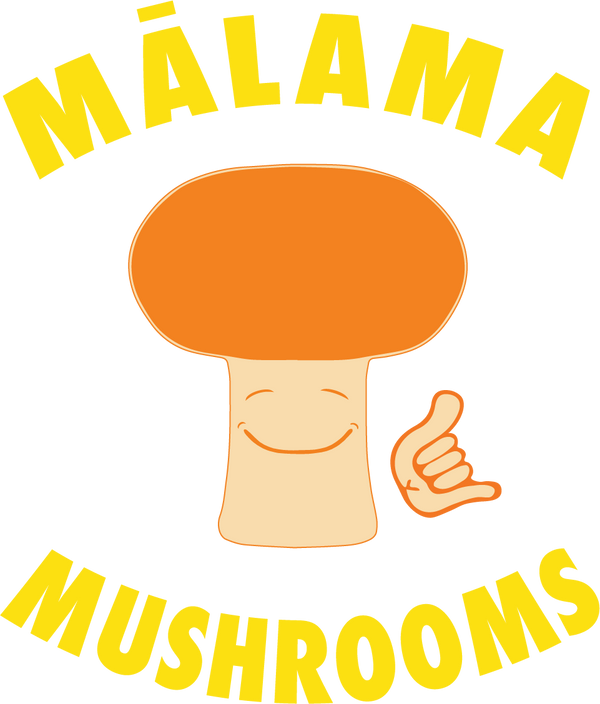Reishi: "Mushroom of Immortality"
Share

'Mushroom of Immortality'? Seems like a bit of an exaggeration for a mushroom but this is an actual translation of Reishi's Chinese name Lingzhi. Reishi is one of the most studied and popular of medicinal mushroom mycoverse. Its popularity is due to its deep history of use expanding over millennia, but also its expansive breadth of medicinal research conducted on human patients with several exciting findings including bolstering the immune system (1)(2)(3), treating stress & chronic fatigue (4)(5), diabetes (6), heart disease (6), cancer (3), just to name a few. This plethora of uses is no doubt why it is considered the 'Mushroom of Immortality' and why it is the object of mush love amongst people wanting health, wellness, and balance in their lives.

When I show most people a Reishi, they get really confused; "This is a mushroom?" I understand the confusion. Most think of mushrooms as the soft, white-button kind in the grocery store. Reishi is drastically different: Bright or crimson red, hard as tree bark, kidney-shaped, and a shiny varnished-esque top get most people to question its legitimacy as a mushroom. It doesn't help when I show them an antler version of Reishi, which is the result of certain cultivation techniques manipulating the amount of carbon dioxide in its growing environment.

Depending on which part of the world in from North America to Asia to the Amazon you may find wild Reishi species on hard woods such as oaks, or conifers such as Eastern hemlocks and white fir. Some species can grow perennially and some annually. In Hawai'i, I have found annual species growing on living & recently dead Koa tree. The annuals stay pretty modest in size but perennials can get GIGANTIC! The Reishi in Hawai'i can get small-table size but I have seen really old ones on the United States mainland bigger 5 ft. across!!The species reported here in Hawaii is Ganoderma australe, but I haven't seen genetic data on it so I suspect it a native, unnamed species unique to Hawai'i, in which case, it could have unnamed medicinal compounds as well....but more on that later! :)

Reishi has an abundance of scientific studies showing its medical credibility. It makes sense as it has been around for millennia! The earliest mention of Lingzhi was in the era of the first emperor of China during the Ch’in Dynasty (221-207 B.C.). It has been depicted throughout Chinese literature and art since. Modern research on Reishi has caught up with its historical claims. Search “Studies on Ganoderma” and you’ll have your work cut out for you sifting through 30,000 extensive studies. There are reports that large pharmaceutical companies has supported this large interest.

Reishi mushroom extracts have immunomodulatory effects, which is a fancy way of saying it can the modulate the immune system. Reishi is able to lower the immune system when overstimulated, and vice versa, increase its activity when weakened.(1)(2) There has also been much praise for Reishi as it was shown in the literature to lower fatigue syndrome and increase subjective well-being. These studies were conducted in human patients, and showed results even in those with severe conditions such advanced-staged cancer! (1)(2)(4)(5). As mentioned, it is a hard conk like mushroom with the beneficial polysaccharides & triterpenes bound up in it's tough chitinous cell wall. So, if you find a wild Reishi, it is important to do an extraction to make the compounds bioavailable and able to be assimilated by your body.

Our Reishi products have all been dried, powderized (which makes it easier to use but also creates more surface area for the extraction), extracted for three hours, and dried again. We offer the final powder extract of the Reishi in our shop, as well as it mixed with unsweetened drinking-cocoa in our Reishi Cacao Mix.
Last but not least, it is one of the main mushrooms used in our delectable mushroom chocolate!

Works Cited
(1) Monitoring of immune responses to a herbal immuno-modulator in patients with advanced colorectal cancer.
Chen X1, Hu ZP, Yang XX, Huang M, Gao Y, Tang W, Chan SY, Dai X, Ye J, Ho PC, Duan W, Yang HY, Zhu YZ, Zhou SF.
https://www.ncbi.nlm.nih.gov/pubmed/16428086
2. Ganoderma lucidum ("Lingzhi"), a Chinese medicinal mushroom: biomarker responses in a controlled human supplementation study.
Wachtel-Galor S1, Tomlinson B, Benzie IF.
https://www.ncbi.nlm.nih.gov/pubmed/14756912
3. Effects of ganopoly (a Ganoderma lucidum polysaccharide extract) on the immune functions in advanced-stage cancer patients.
Gao Y1, Zhou S, Jiang W, Huang M, Dai X.
https://www.ncbi.nlm.nih.gov/pubmed/12916709
4. Spore Powder of Ganoderma lucidum Improves Cancer-Related Fatigue in Breast Cancer Patients Undergoing Endocrine Therapy: A Pilot Clinical Trial.
Zhao H1, Zhang Q, Zhao L, Huang X, Wang J, Kang X.
https://www.ncbi.nlm.nih.gov/pubmed/22203880
5. A randomized, double-blind and placebo-controlled study of a Ganoderma lucidum polysaccharide extract in neurasthenia.Tang W1, Gao Y, Chen G, Gao H, Dai X, Ye J, Chan E, Huang M, Zhou S.https://www.ncbi.nlm.nih.gov/pubmed/15857210
6. Study of potential cardioprotective effects of Ganoderma lucidum (Lingzhi): results of a controlled human intervention trial.
Chu TT1, Benzie IF, Lam CW, Fok BS, Lee KK, Tomlinson B.
https://www.ncbi.nlm.nih.gov/pubmed/21801467
*While Ganoderma lucidum is the type species of the Ganoderma genus, all of the species within the genus are highly revered. An important note is that the organization or the Ganoderma genus, much like a lot of mycological taxonomy right now, is simply chaos. A lot of Ganoderma species are referred to as Ganoderma lucidum though they may actually be one of the potential other 480 known species in Ganoderma. A reason behind this large confusion in the mycological world is due to recent advancements in our identification abilities with genetic technology that never existed when some of these original studies were conducted. That said, it is believed that all, or at least, most of the members of the Reishi's genus have health benefits.


